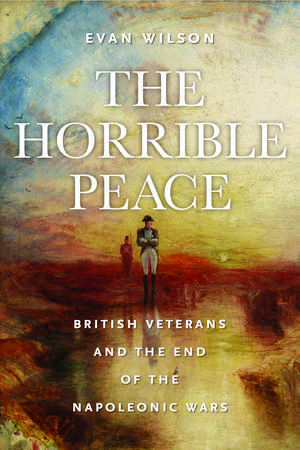The Horrible Peace: British Veterans and the End of the Napoleonic Wars: Veterans
Autor Evan Wilsonen Limba Engleză Paperback – 30 iun 2023
Examining the process of demobilization and its consequences for British society, Evan Wilson draws on archival research and veterans’ memoirs to tell the story of this period through the experiences of veterans who struggled to reintegrate and soldiers and sailors who remained in service as Britain attempted to defend and expand the empire. Veterans were indeed central to Britain’s experience of peace, as they took to the streets to protest the government’s indifference to widespread unemployment and misery. The fighting did not stop at Waterloo.
| Toate formatele și edițiile | Preț | Express |
|---|---|---|
| Paperback (1) | 263.09 lei 3-5 săpt. | |
| University of Massachusetts Press – 30 iun 2023 | 263.09 lei 3-5 săpt. | |
| Hardback (1) | 585.87 lei 3-5 săpt. | |
| University of Massachusetts Press – 30 iun 2023 | 585.87 lei 3-5 săpt. |
Preț: 263.09 lei
Nou
Puncte Express: 395
Preț estimativ în valută:
50.36€ • 51.89$ • 42.51£
50.36€ • 51.89$ • 42.51£
Carte disponibilă
Livrare economică 10-24 februarie
Preluare comenzi: 021 569.72.76
Specificații
ISBN-13: 9781625347336
ISBN-10: 1625347332
Pagini: 288
Ilustrații: 8 illus.
Dimensiuni: 152 x 229 x 30 mm
Greutate: 0.43 kg
Editura: University of Massachusetts Press
Colecția University of Massachusetts Press
Seria Veterans
ISBN-10: 1625347332
Pagini: 288
Ilustrații: 8 illus.
Dimensiuni: 152 x 229 x 30 mm
Greutate: 0.43 kg
Editura: University of Massachusetts Press
Colecția University of Massachusetts Press
Seria Veterans
Notă biografică
EVAN WILSON is associate professor at the U.S. Naval War College and author of A Social History of British Naval Officers, 1775–1815.
Recenzii
“Wilson’s book contributes significantly to our understanding of the impact of the Napoleonic Wars and the experiences of those who served in it. It also makes a contribution to our understanding of larger processes, most notably the long-term transition over the past several centuries in the role and status of those who have served in armed forces.”—Samuel Clark, British Journal for Military History
“The Horrible Peace makes novel arguments, and its focus on demobilization offers a truly original take on the Napoleonic era. This is a vital book and represents a crucial contribution to our understanding of warfare, politics, and society in early nineteenth-century Britain.”—James Davey, author of In Nelson’s Wake: The Navy and the Napoleonic Wars
“By welding together the post-war political battles—establishment politicians against radicals, bosses against industrial workers—and further weaving into that the fate of thousands of demobilized soldiers and sailors, Wilson produces an exciting and unpredictable narrative, well explained.”—Roger Knight, author of Convoys: The British Struggle Against Napoleonic Europe and America
“The Horrible Peace is a seminal work. Broad ranging but sharply focused, it is the first history of British demobilization at the end of the Napoleonic Wars and its consequences. It fills a major gap in the existing literature and raises broader questions about the nature of early nineteenth-century Britain.”—Martin Wilcox, lecturer in history at the University of Hull
“The Horrible Peace makes novel arguments, and its focus on demobilization offers a truly original take on the Napoleonic era. This is a vital book and represents a crucial contribution to our understanding of warfare, politics, and society in early nineteenth-century Britain.”—James Davey, author of In Nelson’s Wake: The Navy and the Napoleonic Wars
“By welding together the post-war political battles—establishment politicians against radicals, bosses against industrial workers—and further weaving into that the fate of thousands of demobilized soldiers and sailors, Wilson produces an exciting and unpredictable narrative, well explained.”—Roger Knight, author of Convoys: The British Struggle Against Napoleonic Europe and America
“The Horrible Peace is a seminal work. Broad ranging but sharply focused, it is the first history of British demobilization at the end of the Napoleonic Wars and its consequences. It fills a major gap in the existing literature and raises broader questions about the nature of early nineteenth-century Britain.”—Martin Wilcox, lecturer in history at the University of Hull





